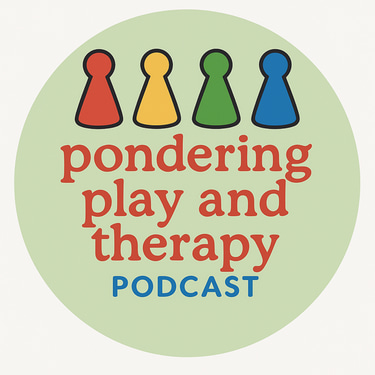Exploring Attachment and Play: Insights from Colby Pearce
In a recent episode of "Pondering Play and Therapy," Philippa welcomed Colby, a clinical psychologist with over 30 years of experience working with children and young people recovering from challenging starts in life. The conversation spans an enlightening exploration of attachment theory, the importance of play, and the profound impact of consistent, responsive relationships on a child's development.
Philippa
6/13/20252 min read


Understanding Attachment Theory
Colby delves into the essence of attachment theory, explaining it as a foundational dependency relationship that forms between infants and their primary caregivers. This connection becomes a blueprint for how children approach life and relationships. Colby explains, "Attachment relationships and attachment style... impact the way in which a child approaches life and relationships." He emphasises the diversity of attachment relationships that children can form, highlighting how different types of attachments can influence a child's overall attachment style.
In simplifying attachment theory for parents, Colby describes it as "a continuum of depth and strength." He underscores the importance of consistent and nurturing relationships in shaping a child's attachment security, suggesting that children need multiple secure relationships to feel confident and supported.
The Role of Play in Development
Play is more than just a pastime for children; it is a critical vehicle for building connection and fostering emotional growth. Colby advocates for the power of play in therapy and everyday life, suggesting that it provides a unique opportunity for relational connection. He states, "Play is probably the best way... to expose a child to relational connection without them defending against that connection."
Philippa and Colby discuss how play doesn't need to be lengthy or structured; even brief moments of shared joy and connection can have a lasting impact. Colby explains that these interactions help children feel seen and valued, reinforcing their sense of self-worth and security.
Consistency and Connection as Core Principles
Throughout their conversation, Philippa and Colby highlight the dual importance of consistency and connection in caregiving. Colby outlines how these elements form the primary task of caring for children, noting that while children can survive in inconsistent environments, thriving requires a consistently nurturing one. "Our primary task is not just to provide a consistent environment; it's to provide a consistently good environment... where there's connection," he asserts.
Colby also shares an acronym, AURA (Accessible, Understanding, Responsive, and Attuned), as a guide for adults to provide the kind of relational experiences children need. This framework emphasises the importance of adults being present and empathetic in their interactions with children, particularly during play.
Hope and Change: The Transformative Power of Good Relationships
As the podcast episode draws to a close, Philippa emphasises the hopeful message that Colby conveys about the potential for recovery and growth in children from challenging backgrounds. Colby affirms that even if a child has had difficult early experiences, meaningful change is achievable through "consistent, predictable care" and the presence of "good adults" in their lives.
In summary, this episode of "Pondering Play and Therapy" offers valuable insights into how attachment theory, the role of play, and the significance of consistent caregiving can shape positive outcomes for children. For those interested in exploring further, Colby’s work and resources are available on the Secure Start website.
If you found this podcast enlightening, consider subscribing to our newsletter to stay updated on future episodes.
